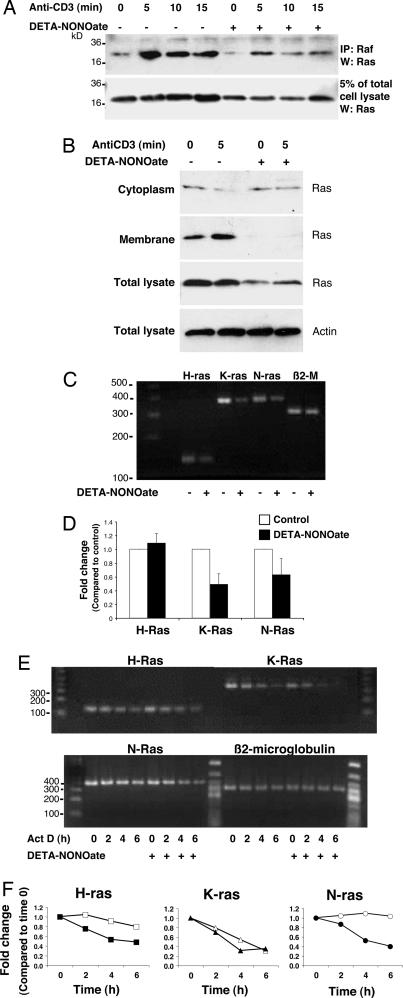Fig. 5.
Exogenous NO inhibits Ras expression in LAK cells. (A) NO decreases Ras expression. LAK cells were pretreated with DETA-NONOate for 18 h and then stimulated with antibody to CD3. Cell lysates were precipitated with antibody to Raf, and precipitants were immunoblotted with antibody to Ras. Pretreatment with DETA-NONOate decreases Ras expression, but Ras can still interact with Raf. (B) NO inhibits Ras membrane localization. LAK cells were pretreated with DETA-NONOate for 18 h and then stimulated with antibody to CD3. Cell lysates were separated into cytoplasmic and membrane fractions and immunoblotted with antibody to Ras. Pretreatment with DETA-NONOate decreases Ras localization to membranes. (C) NO decreases steady-state Ras RNA levels. LAK cells were pretreated with DETA-NONOate for 18 h, and total RNA was analyzed by RT-PCR for Ras isoform mRNA or β2-microglobulin as a control. (D) NO decreases steady-state Ras RNA levels; quantification of the RT-PCR performed above is shown. (E) NO decreases stability of Ras RNA levels. LAK cells were pretreated with DETA-NONOate for 18 h, mRNA synthesis was inhibited by actinomycin D, and total RNA was analyzed by RT-PCR for Ras isoform mRNA. (F) Quantitation of NO’s effect on Ras RNA stability after actinomycin D treatment. The RT-PCR signal was measured by densitometry, normalized to the signal intensity at time 0, and then normalized to β2-microglobulin band intensity. NO pretreatment (filled symbols) decreases the mRNA stability of some isoforms of Ras compared with control (open symbols).

